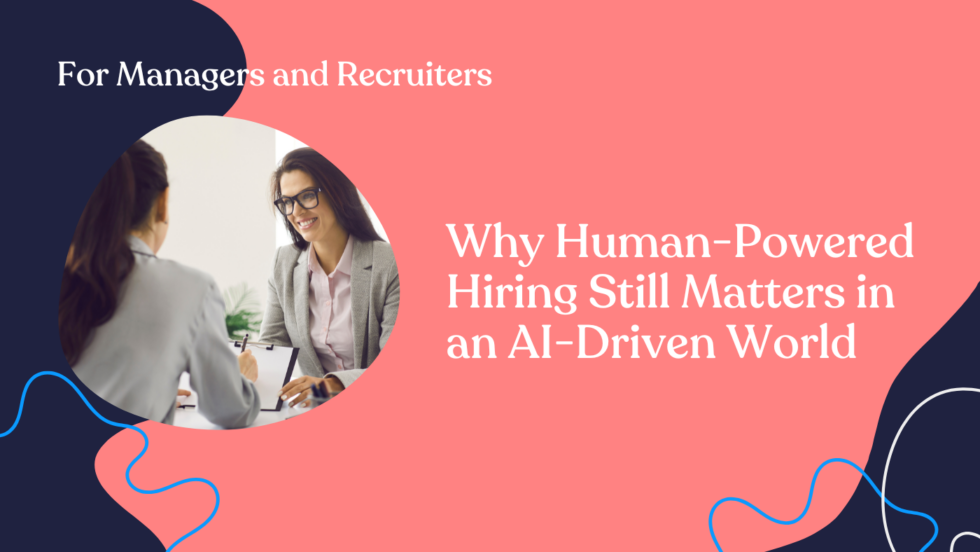
With artificial intelligence (AI) garnering more attention by the day, we’re hearing from talent and hiring leaders on the impact it will have when sourcing early career professionals. (To learn more about the use of AI in sales, check out this blog.) While the technological advancements associated with AI have undoubtedly made some hiring processes more efficient, human-centered hiring remains just as, if not more important than before.
AI in hiring
To highlight the power of AI, we asked ChatGPT to “explain how AI is used to hire entry level professionals.” This was its response:
AI is increasingly being used to hire entry-level professionals. Here’s how it typically works:
- Screening resumes: AI-powered software can scan and screen resumes to identify candidates who meet the required qualifications, such as education and experience. This process helps to eliminate unqualified candidates and allows recruiters to focus on the most promising applicants.
- Conducting initial interviews: AI can also conduct initial interviews by asking candidates a series of pre-determined questions. These questions can be tailored to the specific position and can help to identify candidates who possess the necessary skills and knowledge.
- Analyzing candidate responses: AI can analyze the responses provided by candidates during the initial interviews to determine which candidates are the best fit for the position. This analysis can take into account factors such as the candidate’s tone of voice, word choice, and body language.
- Predictive analytics: AI can also use predictive analytics to identify which candidates are most likely to succeed in the position based on their past performance, experience, and other factors.
Overall, AI can help recruiters to quickly and efficiently identify the most qualified candidates for entry-level positions, saving time and resources and improving the quality of hires. However, it’s important to note that AI should not be the sole decision-maker in the hiring process, and human input and oversight is still necessary to ensure fairness and avoid potential biases.
As you can see, artificial intelligence is a powerful tool; however, as the last sentence of ChatGPT’s explanation stated, human involvement is still needed in a successful hiring process. Let’s dive into where and why human-led hiring is important.
The human component in hiring
Let’s start with “Screening resumes”. If you’re familiar with the Vendition recruitment model, then you know how we feel about resume-based hiring for early career roles. As a company who believes in potential over credentials, we understand the need to consider a candidate’s soft skills over their job experience or educational background. While AI can help sift through an otherwise overwhelming amount of applications, it’s likely to overlook candidates who may very well have the social, emotional, and behavioral skills needed to succeed on the job as soft skills are hard to put on paper.
Human involvement in “conducting initial interviews” and “analyzing candidate responses” is critical. We’ve already established that if you trust AI alone to select qualified candidates from a pile of resumes, then you’re likely missing out on potentially high-performing talent. To take this a step further and allow AI to conduct initial interviews and analyze candidate responses is to ignore the nuances of human connection that can only be identified through human-to-human interactions. A skilled interviewer can tell if a candidate is nervous or on edge based on body language or responses and then can employ questions or other tactics to help break the mood; and if the candidate isn’t responding to the question or appears confused, the interviewer can ask the question in a different way to help clear up any confusion.
For example, say you’re looking to hire a candidate with high levels of social engagement. This skill manifests just as much in how a candidate interacts (i.e., do they ask you about your day?) as it does in how they answer specific questions. AI is developing rapidly, but do you really trust a robot to pick up on social cues the same way a human interviewer would?
Lastly, while making data-driven decisions is always a smart idea, using AI’s “predictive analyses” on its own needs a caution flag because you need to know and understand exactly what data is driving your decisions. Often, these predictive analytics focus on past experience, something that early career professionals are still building. That’s why we recommend assessing candidates for the specific skills crucial to your open position, and allowing their assessment scores to guide — but not completely dictate — your hiring decisions. In other words, automated candidate assessments should never take the place of human assessments, and should only serve as a supplement to your hiring process.
How Vendition helps
Vendition’s thorough recruitment strategy has always been and will always be technology-supported and human-powered. All Vendition candidates take our proprietary Vendition Success Aptitude Test (VSAT), which assesses the soft skills critical to the success of any early career professional. Candidates’ VSAT scores are then adjusted by members of the Vendition team (based on their human-to-human interaction with the candidate) before being shared with our hiring partners. This assessment, in addition to the resume, relevant experience, and video snippets from the candidates themselves, allows hiring partners to get the full story on each candidate they review.
With Vendition, you can rest assured that real people are supporting you every step of the way. Ready to partner with us? Fill out the form below to get started.
Want to save time in the interviewing process? Get pre-vetted, hand-selected candidates from Vendition for your next sales hire. Contact us today to learn more.
